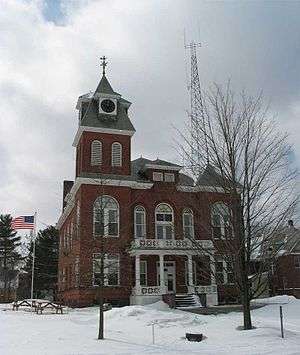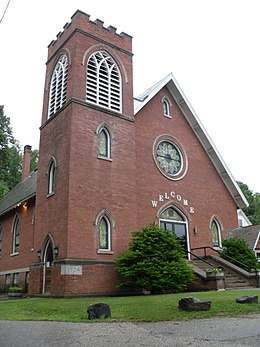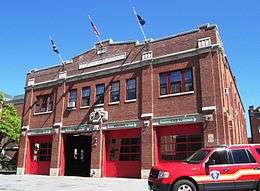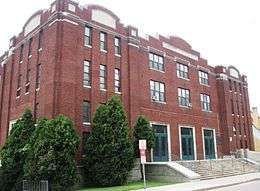Frank Lyman Austin
Frank Lyman Austin (1874-1942) was an American architect from Burlington, Vermont. He designed several buildings that have been placed on the National Register of Historic Places and others that are contributing buildings to listed historic districts.
Frank Lyman Austin | |
|---|---|
| Born | 1874 |
| Died | 1942 Burlington, Vermont |
| Nationality | United States |
| Occupation | Architect |




Life and career
Frank Lyman Austin was born in Burlington in 1874 to Zachary T. Austin, a local contractor.[1] The Austin firm went back to around 1865, when Frank's grandfather, Lyman, established himself as a carpenter. Frank Austin worked in his father's office, and trained as an architect. In 1904, he left his father's firm and opened an office on his own account. Upon his father's death in 1910, Austin completed the leftover work and absorbed the firm's assets.[2]
Austin's first significant work was the Champlain School of 1909, in Burlington. These small-scale beginnings soon grew into a large office, which resulted in the design of some of the city's (and state's) largest buildings. Eventually, Austin served as Vermont's state architect. In 1939, Austin's son, Lyman Dinsmoor Austin, became a partner in the firm. Upon Austin's death in 1942, his son dissolved the firm and left Burlington.[2] Austin & Austin had been the oldest architectural firm in the state.[3]
Selected works
Frank Lyman Austin, 1904-1939
- 1904 - Strong Theatre, 203 Main St, Burlington, Vermont[4]
- An addition to a pre-existing office building, demolished in 1970
- 1907 - Richmond High School, Richmond, Vermont[5]
- 1908 - Masonic Temple, 58 Bridge St, Richmond, Vermont[6]
- 1909 - Burlington Mutual Fire Insurance Building, 188 Main St, Burlington, Vermont[7]
- 1909 - Champlain School (Old), 817 Pine St, Burlington, Vermont[2]
- 1910 - Masonic Temple, 51 Washington St, Rutland, Vermont[8]
- 1910 - National Bank of Middlebury Building, 32 Main St, Middlebury, Vermont[9]
- 1910 - New Sherwood Hotel, 29 Church St, Burlington, Vermont[10]
- Burned in 1940.
- 1911 - Fairfield Street School, 72 Fairfield St, St. Albans, Vermont[11]
- 1911 - Lamoille County Courthouse, 154 Main St, Hyde Park, Vermont[12]
- 1912 - Colchester (Winooski) High School, 31 E Spring St, Winooski, Vermont[13][14]
- A carbon copy of the Champlain School. Demolished.
- 1912 - Swanton School, 21 Church St, Swanton, Vermont[15]
- 1913 - Burlington City Hall (remodeling), 149 Church St, Burlington, Vermont[16]
- Demolished.
- 1914 - Richford Town Hall, 94 Main St, Richford, Vermont[17]
- 1916 - St. Johnsbury State Armory, 1249 Main St, St. Johnsbury, Vermont[18]
- 1917 - Milton S. Bostwick House, 63 Bank St, St. Albans, Vermont[19]
- 1917 - Old Dorm, Vermont Technical College, Randolph, Vermont[20]
- 1920 - Burnham Hall, 52 E River Rd, Lincoln, Vermont[21]
- 1921 - Alumni Hall, Vermont Academy, Saxtons River, Vermont[22]
- 1922 - Northfield State Armory, 61 Wall St, Northfield, Vermont[23]
- 1923 - Ilsley Library, 75 Main St, Middlebury, Vermont[24]
- 1924 - Calvary Baptist Church, 156 Main St, Springfield, Vermont[25]
- 1925 - Burlington Jr. High School (Old), 299 Main St, Burlington, Vermont[2]
- 1926 - Brownell Library, 6 Lincoln St, Essex Junction, Vermont[3]
- 1926 - Central Fire Station, 136 S Winooski Ave, Burlington, Vermont[2]
- 1927 - Burlington Memorial Auditorium, 250 Main St, Burlington, Vermont[2]
- 1929 - Burlington State Armory, 60 Main St, Burlington, Vermont[2]
- 1929 - West Rutland Public Library, 595 Main St, West Rutland, Vermont[3]
- 1931 - Montpelier State Armory, 55 Barre St, Montpelier, Vermont[26]
- 1932 - Y. M. C. A. Building, 266 College St, Burlington, Vermont[27]
- In association with James W. O'Connor, of New York
- 1935 - U. S. Post Office, 132 Main St, Springfield, Vermont[25]
Austin & Austin, 1939-1942
- 1939 - Elihu B. Taft School, 12 S Williams St, Burlington, Vermont[28]
- 1941 - Gary Home, 149 Main St, Montpelier, Vermont[29]
References
- New England Families: Genealogical and Memorial. Ed. William Richard Cutter. Vol. 2. 1914.
- Champlain School NRHP Nomination. 1982.
- Lamb, Wallace E. The Lake Champlain and Lake George Valleys. Vol. 3. New York: American Historical Company, Inc., 1940.
- American Architect and Building News 5 March 1904: x.
- School Board Journal May 1907: 28.
- American Architect and Building News 19 Aug. 1908: 17.
- Engineering Record 25 Sept. 1909: 45. New York.
- Engineering Record 13 Nov. 1909: 44.
- Engineering Record 5 Feb. 1910: 67.
- Engineering Record 15 Jan. 1910: 46a.
- Fairfield Street School NRHP Nomination. 1996.
- Engineering Record 18 March 1911: 72.
- American School and University 1930: 436.
- Blondin, Al and Anastasia Pratt. Images of America: Winooski. 2015.
- Swanton School NRHP Nomination. 2002.
- Engineering Record 25 Jan. 1913: 46.
- Municipal Journal 14 May 1914: 18.
- American Contractor 10 June 1916: 66.
- American Contractor 28 April 1917: 49.
- American Contractor 27 Sept. 1917: 40.
- American Contractor 6 Nov. 1920: 54.
- American Contractor 29 Jan. 1921: 56.
- American Contractor 27 May 1922: 56.
- American Contractor 28 Oct. 1922: 44.
- Springfield Downtown Historic District NRHP Nomination. 1983.
- Vermont Public Documents. 1932.
- Domestic Engineering 1932: 114.
- American School Board Journal 1939: 72.
- Montpelier Historic District NRHP Nomination Amendment. 2009.